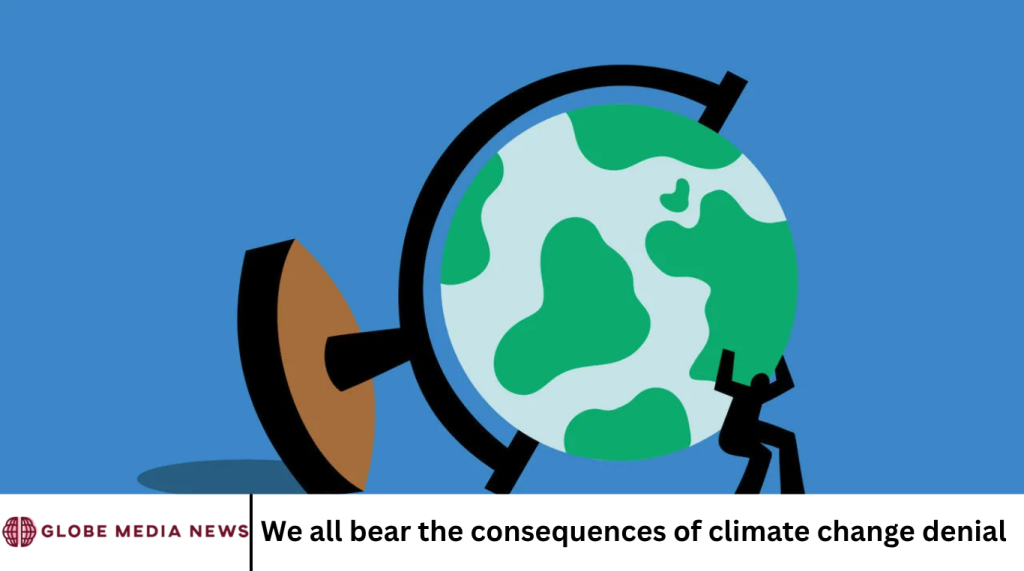Climate change is no longer a distant threat or a mere scientific hypothesis—it is a pressing reality impacting ecosystems, economies, and communities worldwide. Yet, despite overwhelming scientific consensus, climate change denial persists in various forms, from outright rejection of climate science to minimizing its severity or delaying policy action.
This denial not only undermines global efforts to combat climate change but also ensures that its consequences affect us all. Understanding the nature of climate change denial and its broad repercussions is essential to fostering awareness, resilience, and collective responsibility.
More Read: Thousands Ordered to Evacuate as Wildfire Rages Through Malibu, California
What Is Climate Change Denial?
Climate change denial refers to the refusal to accept or acknowledge the scientific consensus that climate change is happening and that human activities, especially the burning of fossil fuels, are the primary drivers. Denial can take several shapes:
- Denial of the existence of climate change: Claiming that global warming is a natural phenomenon or outright rejecting evidence of rising global temperatures.
- Denial of human contribution: Acknowledging climate change but denying humans’ role in causing it.
- Denial of consequences or urgency: Accepting the facts but dismissing their seriousness or the need for immediate action.
These perspectives can be fueled by misinformation, political agendas, economic interests, or ideological beliefs.
Why Does Climate Change Denial Persist?
Several factors contribute to the persistence of climate change denial:
- Economic Interests: Fossil fuel industries and associated sectors have vested interests in maintaining the status quo and may fund misinformation campaigns.
- Political Polarization: Climate change has become a highly politicized issue in many countries, leading to divisions that inhibit consensus.
- Cognitive Biases: Humans tend to avoid uncomfortable truths and may engage in motivated reasoning to reject inconvenient facts.
- Media Influence: Some media outlets give disproportionate attention to denial voices under the guise of “balanced reporting.”
- Lack of Awareness: In some regions, limited access to scientific information or education exacerbates denial or apathy.
The Universal Impact of Climate Change Denial
While denial may be an individual or political stance, its effects ripple through societies and ecosystems globally. Here’s how everyone bears the consequences:
Increased Frequency and Severity of Natural Disasters
Denial delays essential policy measures and emissions reductions, resulting in worsening climate conditions. This leads to more intense hurricanes, wildfires, floods, and droughts—disasters that affect millions regardless of their beliefs.
Economic Costs
Unchecked climate change increases costs related to disaster response, infrastructure damage, healthcare, and agricultural losses. These costs are eventually borne by taxpayers, businesses, and governments worldwide.
Health Impacts
Rising temperatures contribute to heat-related illnesses, spread of infectious diseases, and reduced air quality. Vulnerable populations, including children and the elderly, suffer disproportionately.
Loss of Biodiversity
Climate change threatens ecosystems, endangering countless species and disrupting the balance of nature. This loss affects ecosystem services vital to human survival, like pollination and water purification.
Social and Political Instability
Resource scarcity due to climate change can lead to conflicts, forced migration, and political unrest, affecting global stability and security.
The Cost of Inaction
Denial and delayed action are costly not only environmentally but also socially and economically. According to various studies:
- Every year of delay in emissions reduction increases the difficulty and cost of limiting global warming.
- Early action could save trillions of dollars in damages.
- Investing in renewable energy and green technologies can stimulate economic growth and create jobs.
Overcoming Climate Change Denial
Combating denial requires multi-faceted approaches:
- Education and Awareness: Improving scientific literacy and communicating climate facts effectively.
- Policy Leadership: Governments must commit to ambitious climate goals and transparently share progress.
- Community Engagement: Local actions and grassroots movements can build momentum and social pressure.
- Media Responsibility: Promoting accurate reporting and reducing misinformation.
- Corporate Accountability: Businesses adopting sustainable practices and transparency.
Frequently Asked Question
What exactly causes climate change?
Climate change is primarily caused by increased greenhouse gases in the atmosphere, such as carbon dioxide (CO2) and methane (CH4), which trap heat. Human activities like burning fossil fuels, deforestation, and industrial processes are the main contributors.
Why do some people deny climate change despite scientific evidence?
Denial can stem from political, economic, or ideological reasons, as well as misinformation, cognitive biases, and lack of understanding of scientific data.
How does climate change denial affect the environment?
Denial leads to delayed or inadequate action to reduce emissions and adapt to climate impacts, resulting in worsening environmental degradation, loss of biodiversity, and more extreme weather events.
Can individuals make a difference if governments delay climate policies?
Yes, individual actions like reducing carbon footprints, supporting sustainable products, and advocating for change can collectively make a significant impact and pressure policymakers.
What are the health risks associated with climate change?
Health risks include heatstroke, respiratory diseases from poor air quality, spread of vector-borne diseases, and mental health challenges due to climate-related disasters.
How does climate change denial affect the economy?
It leads to higher costs from disaster recovery, healthcare, and lost productivity, as well as missed economic opportunities in renewable energy and sustainable industries.
What can communities do to combat climate change denial?
Communities can increase awareness through education, promote sustainable practices, hold local governments accountable, and foster dialogue to build consensus on climate action.
Conclusion
Climate change denial is not just an intellectual disagreement; it is a barrier that affects every person on Earth. The longer we deny or delay action, the more severe the consequences become for our planet, economies, and future generations. Recognizing our shared responsibility and embracing facts can empower collective action to mitigate climate change and build a resilient future for all.

